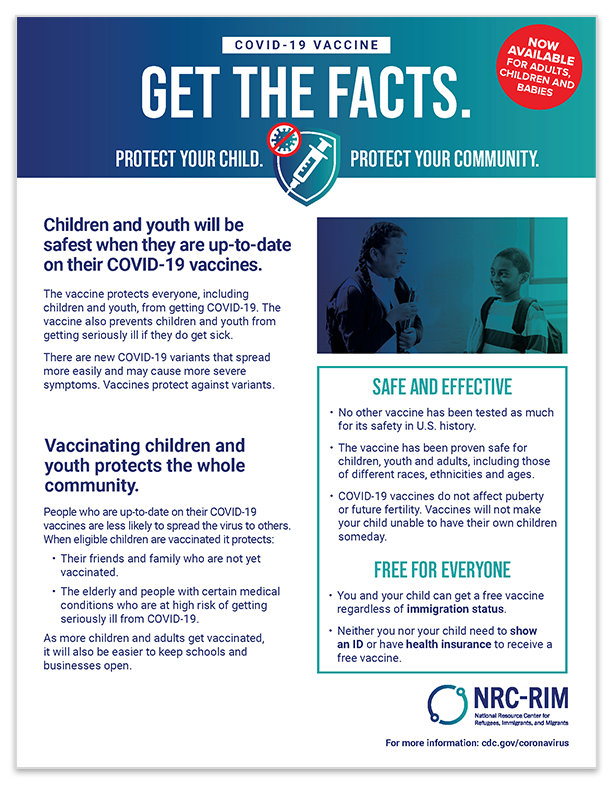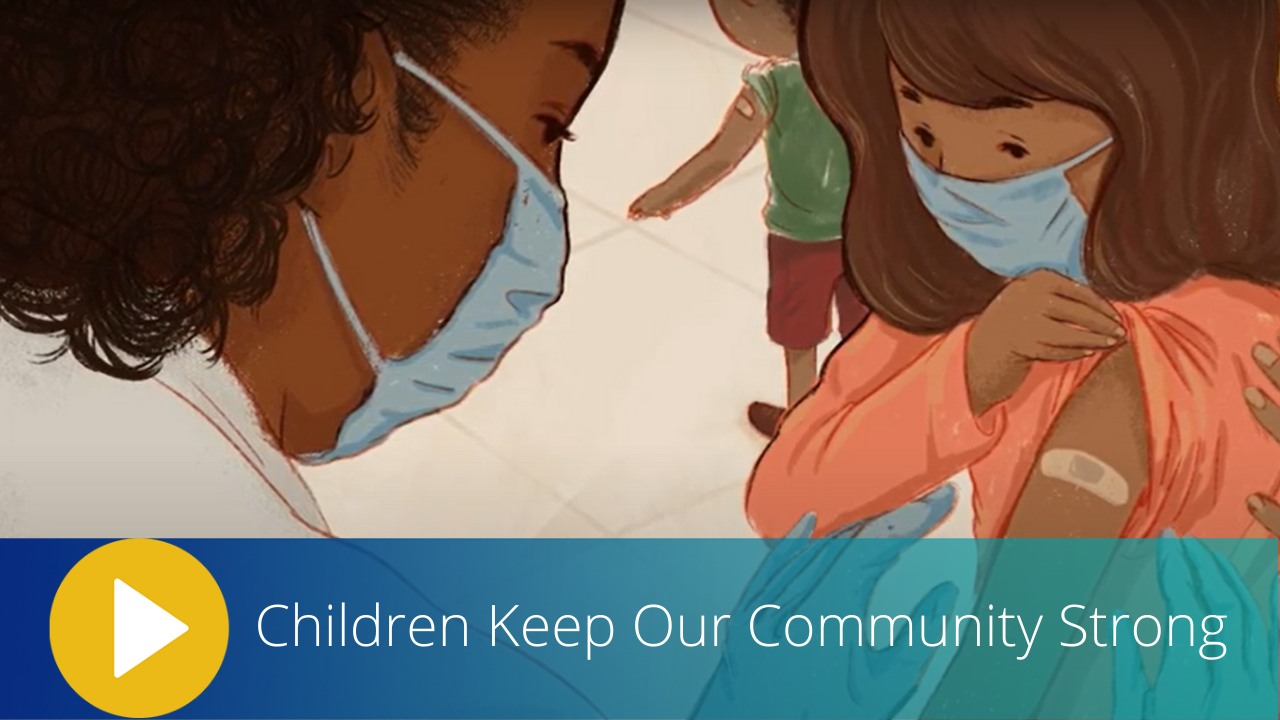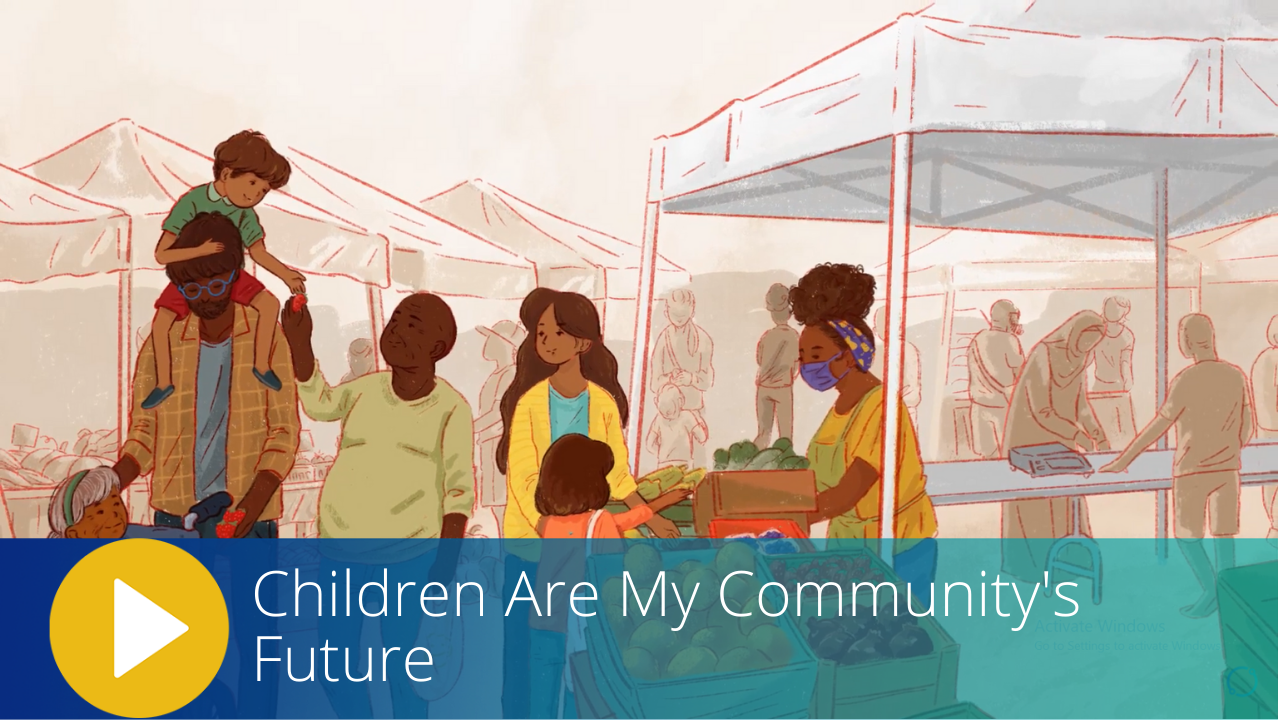
The Centers for Disease Control and Prevention (CDC) recommends the COVID-19 vaccination for everyone age 6 months old and older.
To help stop the spread of COVID-19, it is important to vaccinate individuals of all ages. Widespread vaccination is the key to being able to safely go back to pre-pandemic activities, such as in-person classes, after-school activities, social gatherings, and travel.
It is important to remember:
Below are answers to commonly asked questions about the vaccine that may help you in making the best decision for your child:
Why is it important to vaccinate babies and children when most only experience mild symptoms?
To protect children: even though many babies and children experience only mild symptoms, some will become very ill and die from COVID-19. As of June 2022, COVID-19 is among the leading causes of death among children.
Almost 1300 children have died from COVID-19 in the U.S. The vaccine is safe and protects children from severe illness and death. Children can also experience long-term side effects from a COVID-19 infection that affect their quality of life. Some people call this Long COVID.
COVID-19 can also worsen children’s mental or emotional health and make it harder for them to be successful at school.
Widespread vaccination of children and adolescents is also key to ensuring schools and businesses stay open.
Are the COVID-19 vaccines safe for babies and children?
Yes, careful studies show that COVID-19 vaccines are safe for babies and children in the approved age groups and have met the US Food and Drug Administration’s (FDA) high scientific standards for safety, effectiveness, and manufacturing. Beyond the careful studies, the vaccines continue to be monitored for safety, more than any vaccine in U.S. history. Hundreds of millions of people of different ethnicities, ages, and health conditions have been safely vaccinated. In fact, more than 500 million doses of COVID vaccines have been administered in the United States (data from March 2022).
Are the COVID-19 vaccines effective in babies and children?
Yes, the studies show COVID-19 vaccines are extremely effective in babies and children, especially against hospitalization, severe illness and death. In addition, the studies show that children’s immune systems respond to the vaccine in similar ways to the immune system of older teens and young adults. To get the most protection and effectiveness, your child needs to be up-to-date on their COVID-19 vaccines, including receiving any booster they are eligible for.
My child has already had COVID-19. Do they still need the vaccine?
Yes. Even if your child has already had COVID-19, it is recommended that they receive the COVID-19 vaccine. People who had COVID-19 infection and then get the vaccine have very, very strong protection.
It is possible to get infected with COVID-19 more than once. This is especially true with some variants. This makes COVID-19 vaccination even more important for people who have previously been infected.
Does my child need more than one dose of the vaccine?
Yes. To get the most protection, your child needs to be up-to-date on their COVID-19 vaccines, including getting the second dose of a two-shot vaccine, the third dose of a three-shot vaccine and getting a booster when they are eligible. This is especially true with the new variants, where one shot is not very protective.
Does my child need a booster?
It is important for your child to stay up-to-date on their COVID-19 vaccines, including getting a booster when they are eligible. Currently, boosters are available for people ages 5 and older. If your child is not up-to-date, they are much more likely to get infected with COVID-19, and get dangerously ill or die.
What are possible side effects after vaccination?
While some babies and children may experience no side effects at all, it is also normal to experience some side effects after vaccination. Side effects show that your child’s body is building protection against the virus. Possible side effects after the COVID-19 vaccination include tenderness, redness, and swelling of the area where your child received the shot. In addition, your child may experience tiredness, headache, muscle pain, chills, fever, and nausea. Like adults, these side effects typically last 1 or 2 days and are due to your child's body building an immune response to the virus, NOT from the virus itself.
It is important to note that the benefits of the COVID-19 vaccination are much greater than any potential risk of side effects. Contact your child’s healthcare provider for steps you can take at home to comfort your child after the vaccine. Also contact your child’s healthcare provider if the redness or tenderness where your child received the vaccine gets worse after 24 hours or if the side effects are worrying you and/or do not seem to be going away after a few days.
How is the COVID-19 vaccine experience similar to other vaccination experiences a child may have?
The COVID-19 vaccine experience is very similar to other vaccination experiences. Your child can get their COVID-19 vaccine in a doctor’s office just like they would any other vaccination.
Before the nurse or doctor gives your child the vaccine, they will tell you about it, review your child’s medical history and ask you if you have any questions.
The shot happens very quickly and should be no more or less painful than other vaccines your child has received. Your child will need to stay for 15–30 minutes to make sure they do not have an immediate allergic reaction.
For a day or two after they receive the vaccine, children might experience mild side effects, which is completely normal. Side effects mean the vaccine is teaching your child’s body how to fight COVID-19. Possible side effects include tenderness, redness, and swelling of the area where your child received the shot. In addition, your child may experience tiredness, irritability, headache, muscle pain, chills, fever, and nausea. Contact your child’s healthcare provider for steps you can take at home to comfort your child after the vaccine.
It is important to note that the benefits of the COVID-19 vaccination are much greater than any potential risk of side effects. Serious side effects are very rare. It is much more likely that your child will have serious complications from a COVID-19 infection than from a vaccine.
Once your child is vaccinated against COVID-19, they can safely return to normal activities like attending school, playing sports, and visiting friends and family. As more children and adults get vaccinated, it will also be easier to keep schools and businesses open.
Can my child get a COVID-19 vaccine during the same visit with other vaccines?
Yes, your child can get a COVID-19 vaccine and other vaccines during the same visit (please see CDC’s guidance on Getting Your COVID-19 Vaccine). Talk with your child’s healthcare provider to learn more.
Is the COVID-19 vaccine mandatory for school and daycare? Will my child be able to attend daycare, school and after-school activities if they are not fully vaccinated?
Babies, children and teens are at risk for contracting COVID-19 in daycares, schools and other social settings including after-school activities, summer camps, parties, and social events. Having your child up-to-date on their COVID-19 vaccines, including getting a booster when they are eligible, will help prevent infections with COVID-19. Please contact your child’s daycare or school to learn about their expectations for vaccinations.
Will the vaccine affect my child’s future fertility? What about puberty or menstruation?
No, the COVID-19 vaccines do not affect puberty or future fertility. In rare cases vaccines can change someone's menstruation, but this change is temporary and does not affect fertility.
There are a lot of things that can affect menstruation, including stress from school or work, new medications, illness, or a change in your exercise habits or nutrition. The most important thing to remember is that the COVID-19 vaccines do not affect puberty or fertility.
Do you have any information on recent reports of heart problems (Myocarditis and Pericarditis) after the vaccine?
In April 2021, the CDC was made aware of increased cases of myocarditis and pericarditis (inflammation of the heart) in adolescents and young adults after getting the Pfizer or Moderna or Novavax vaccine. These reports are rare, and these are usually mild and go away quickly. The CDC is investigating and there is close monitoring to identify any new cases. COVID-19 also causes heart problems and is much, much more likely to cause heart problems than the vaccine.
The CDC continues to recommend COVID-19 vaccinations for everyone aged 6 months and older, as the risks of COVID-19 are far greater.
Do children receive the same dose as adults? How do I know this has been designed to have my child's age and physical appearance in mind?
Children age 12 and older receive the same dose as adults.
The COVID-19 vaccines for younger children have been designed and formulated especially for them. Children aged 6 months to 11 years receive a smaller dose. The appropriate dosage is best determined by a child’s age, not his or her size. Smaller needles, designed specifically for children, are used for children under 12.
COVID-19 vaccines have undergone the most intensive safety monitoring in U.S. history. Careful studies show that COVID-19 vaccines are safe for children in the approved age groups and have met the US Food and Drug Administration’s (FDA) high scientific standards for safety, effectiveness, and manufacturing.
My child turned from 11 to 12 years old in between the first and second COVID-19 vaccine dose. What dose should they get now that they are 12?
The COVID-19 vaccines have been designed and formulated for children, with the right dosage best determined by a person’s age – not their size. Therefore, scientists and healthcare providers say that if a child turns from 11 to 12 years old in between their first and second dose, the second dose should be the vaccine for people ages 12 years and older.
Should my family also prioritize getting the flu shot for my child?
Yes. Influenza can be a serious infection anytime and kills a couple hundred children a year. However, this year a flu vaccine is especially important because:
- Signs and symptoms of the flu and COVID-19 can be identical and it can be difficult to figure out which infection your child might have.
- People who get the flu and COVID-19 at the same time may be at even higher risk for severe complications and death.
- If you get very sick with the flu it can be difficult to get medical help. Doctors, clinics and hospitals may not be able to take care of as many patients with severe influenza, or not be able to care as well for people with influenza, because there are so many people sick with COVID-19 filling up emergency rooms, hospitals and intensive care units.
Get the COVID-19 vaccine and the flu vaccine for the most protection.
- Both the flu vaccine and the COVID-19 vaccine protect you, your family, and your community.
- Both vaccines make it less likely for you to get sick and spread illness to others. They also prevent you from getting dangerously ill if you do get sick.
Flu vaccines and COVID-19 vaccines are safe.
- It is safe and effective to get both the COVID-19 vaccine and the flu vaccine at the same time.
- Children who are not yet old enough for the COVID-19 vaccine can receive a flu shot.
How else can I keep my child safe from COVID-19?
Children and youth will be safest when they are up-to-date on their COVID-19 vaccines, including getting a booster when they are eligible. Other ways to keep children safe include:
- Teach your child to wear a mask properly. While getting vaccinated is the most important step to protect your child and your community, wearing a mask provides even more protection.
- Avoid spending time indoors with people who are not wearing a mask.
- Get the flu vaccine for yourself and your child. It is safe and effective to get both the COVID-19 vaccine and the flu vaccine at the same time, and children who are not yet old enough for the COVID-19 vaccine can receive a flu shot.
- Your child should stay home from school or social events anytime they feel sick.
- Teach your child to practice social distancing, and wash their hands frequently.
- Encourage people who spend time around your child to get their COVID-19 vaccine.
I got my COVID-19 vaccine while I was pregnant or breastfeeding. Does my baby still need the vaccine?
Yes, your baby should still get a COVID-19 vaccine. Antibodies can be transferred during pregnancy and through breast milk, but your baby’s protection does not last forever. The COVID-19 vaccine is the most reliable and effective way to protect your baby from severe illness and death.
Can babies and very young children receive a COVID-19 vaccine?
Yes. COVID-19 vaccines are available and strongly recommended for anyone aged 6 months and older.
Children Are My Community's Future
In this video, one immigrant father explains why he chose to vaccinate his two children against COVID-19. "Our two children need our protection," he says. "We are doing everything we can to make sure they can grow up and have their own families someday."
English | Arabic | Burmese | Dari | French | Karen | Kinyarwanda | Lingala
Nepali | Pashto | Russian | Spanish | Swahili | Tigrinya | Ukrainian


